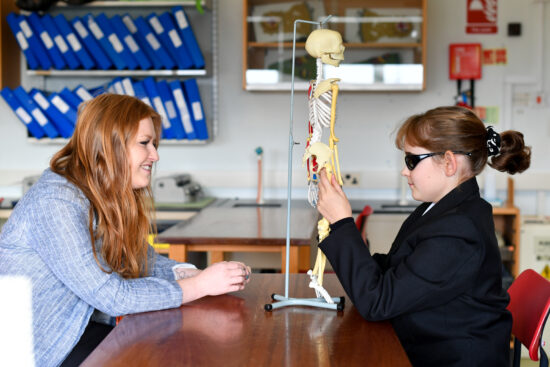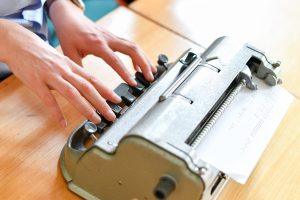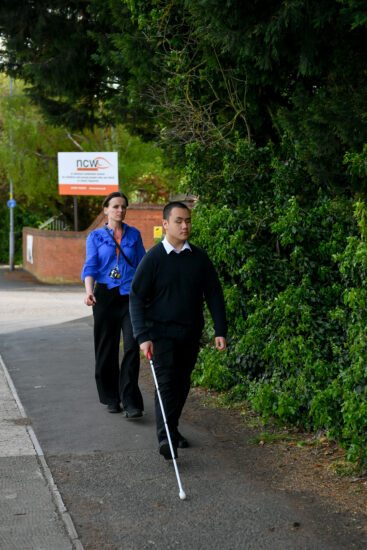Specialist Teaching

At NCW specialist VI skills such as Braille and Access Technology are supported and developed through the curriculum.
All teachers at NCW have (or are working towards) the mandatory qualification to become QTVI (Qualified Teacher of the Vision Impaired).
With many years of training, shared experience and highly developed skills, our teaching staff are absolute specialists in teaching young people who are vision impaired – as well as being subject specialists.
Resources
All resources are prepared following the recognised protocols set out by UKAAF for accessible documents and we have our own protocols for producing accessible electronic documents. As QTVIs, subject teachers understand how to produce good quality modified tactile diagrams and also how to support students in accessing tactile resources. We have a dedicated Transcription department where materials can be modified into the formats required by teachers for their students, whether that is a mathematical diagram, a whole text book or a simple recipe.
Braille
 Students learning Braille receive up to three one-to-one lessons per week following the Fingerprint course from a specialist Braille teacher. Subject teachers are able to support students who haven’t learned all the contractions yet by producing resources in the Fingerprint stage that they are at, using Duxbury software.
Students learning Braille receive up to three one-to-one lessons per week following the Fingerprint course from a specialist Braille teacher. Subject teachers are able to support students who haven’t learned all the contractions yet by producing resources in the Fingerprint stage that they are at, using Duxbury software.
We recognise the importance of literacy and the impact that this has on employability. The NCW library and learning resource centre (LRC) has a large collection of fiction and non-fiction in Braille and large print.
Students are supported to use electronic Braille technology to take advantage of a grant through the charity VICTA to obtain an Orbit 20 Bluetooth Braille display and use Braille displays and Braille inputs linked to laptops or iOS devices and Braillenotes.
Specialist Braille codes such as Music Braille, Maths/Science Braille and different Braille conventions used in Modern Foreign Languages are supported and taught by highly experienced teachers who have developed significant subject specific expertise in these codes.
We also offer the RNIB Braille qualification.
Mobility and Orientation
 Students receive one to one lessons in Mobility during the day and in the evenings from our team of fully qualified instructors which has developed a fully comprehensive Mobility programme consisting of the following modules:
Students receive one to one lessons in Mobility during the day and in the evenings from our team of fully qualified instructors which has developed a fully comprehensive Mobility programme consisting of the following modules:
Cane Skills
Orientation and environment
Sighted Guide techniques
Body Protection
Social skills
Personal safety
The programme includes an assessment to ascertain the extent of residual vision and loss of depth perception in order to devise an appropriate programme for the age and experience of the student.
Once confident, students make their own way around the campus and do not use a cane within the main College building. Subject teachers support the work done in mobility lessons by ensuring that class activities involve independent movement around rooms and learning outside the classroom is encouraged. As a student progresses they are taught local routes, bus and train travel, handling money and shopping – developing essential, safe, transferable skills.
Independent Living Skills

Independent Living Skills lessons form part of the curriculum at each key stage. It is a core subject at Key Stage 3 and 4 and in the Sixth form, students receive personalised one-to-one lessons.
After initial assessment, a programme of study is devised for each student which develops the skills necessary for independent living. These include understanding nutrition, preparing healthy meals, laundry and a range of other skills necessary for independent living.
Where some equipment is specialist for VI most is everyday equipment with easy adaptions and practised methods of use so that students can adapt to different environments where there is no specialist equipment. For residential students these skills are practised under supervision of the care staff in the residential houses during evenings and weekends. Parents are encouraged to support the development of ILS skills through regular communication with ILS staff, training sessions for parents and personalised targets to work on at home.
Activities for Daily Living (ADL)

ADL is a prescribed scheme of work with highly differentiated bespoke plans that are taught in small groups.
In the Sixth form, each student has lessons in ADL and their programme of study is devised following an assessment which determines their current skills and those areas which need to be developed, such as understanding nutrition, preparing healthy meals and sorting their own laundry.
Students make use of the specialist equipment available and so become proficient in using them which leads to them gaining confidence in their independence. They also learn to make adaptions to everyday equipment enabling them them to use their skills beyond NCW e.g. university and at home. For residential students these skills are practised under supervision of the care staff in the hostel during evenings and weekends. Students are given targets to work on at home, thereby extending their learning to other environments.
Information Technology
 Each student’s IT skills are assessed and a personalised programme is devised to develop their skills across a range of IT competencies. There is an ever growing range of Apps and devices that enhance the lives of someone with a vision impairment and all students have access to electronic tablets. Students are able to use their mobile phones at school for uses connected with their learning and independence. Every student at NCW is issued with a laptop utilising a Microsoft Operating System – this being a widely used platform in the workplace. Students have the option to use a range of different speech software to suit their differing experience and preferences. Each student is taught to touch type if they do not already have this skill.
Each student’s IT skills are assessed and a personalised programme is devised to develop their skills across a range of IT competencies. There is an ever growing range of Apps and devices that enhance the lives of someone with a vision impairment and all students have access to electronic tablets. Students are able to use their mobile phones at school for uses connected with their learning and independence. Every student at NCW is issued with a laptop utilising a Microsoft Operating System – this being a widely used platform in the workplace. Students have the option to use a range of different speech software to suit their differing experience and preferences. Each student is taught to touch type if they do not already have this skill.
Self Advocacy
As one of the specialist VI curriculum outcomes, self-advocacy is something that we promote through the mobility and ILS lessons. NCW also has a Student council with members from each key stage who meet with the senior student team and SLT to discuss issues that they want addressing. Students are also invited to join College working parties such as the Equality and diversity group.
The SEND Code of Practice (7.38) highlights self-advocacy as an important part of preparation for adulthood:
independent living – this means young people having choice, control and freedom over their lives and the support they have, their accommodation and living arrangements, including supported living
Students are included in conversations around targets and their progress in relation to their targets.


